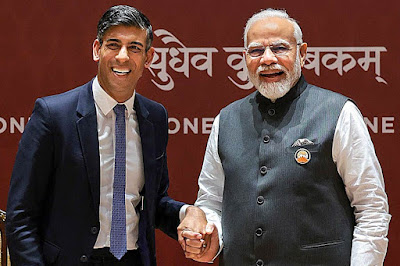Delays and Challenges: Why the UK-India Trade Deal Remains Elusive
 |
| The two leaders looked forward to the agreement of a UK-India free trade deal. |
Last October, hopes were high as both the United Kingdom and India pledged to negotiate and finalize a comprehensive trade deal that would strengthen economic ties between the two nations. However, as we approach a new October, the promised trade deal remains conspicuously absent. The prolonged negotiations raise questions about the factors contributing to this delay and whether the agreement will ever come to fruition.
 |
Complex Negotiations:
Trade negotiations are inherently complex, and reaching a mutually beneficial agreement can take time, even for countries with shared historical ties like the UK and India. Several factors have contributed to the delay in finalizing the trade deal:
Diverse Economies: The UK and India have significantly different economies. The UK is a developed nation with a highly industrialized economy, while India is an emerging economy with a wide range of industries and varying levels of development across different states. Harmonizing these economic differences and addressing the concerns of various stakeholders on both sides is a formidable challenge.
Geopolitical Considerations: Both nations must consider their geopolitical relationships with other countries. The UK's recent departure from the European Union adds complexity, as it seeks to establish its own trade agreements. India, on the other hand, has ongoing trade negotiations with various countries and must balance its interests carefully.
 |
Agricultural Issues: Agriculture is a contentious issue in trade negotiations. Indian farmers have concerns about competition from cheaper British agricultural products, while the UK seeks to expand its agricultural exports to India. Bridging these differences is crucial but challenging.
Investment and Services: The trade deal isn't just about goods but also includes services and investment. Ensuring favorable terms for both nations' service industries and protecting investments requires intricate negotiations.
Regulatory Framework: Harmonizing regulatory standards, especially in sectors like pharmaceuticals and food safety, is a time-consuming process. Both nations must ensure that products meet the necessary quality and safety requirements.
Public and Political Pressure:
Both the UK and India face internal pressures that can affect the negotiation process. In India, protests by farmers and concerns about protecting domestic industries have made the government cautious about any concessions. In the UK, there is a need to demonstrate that Brexit will result in advantageous trade deals, which can put pressure on negotiators to secure a favorable outcome.
While the UK-India trade deal was promised by last October, its delayed progress is not surprising given the complex nature of trade negotiations. Bridging the economic, geopolitical, and regulatory differences between the two nations requires time and patience. It is essential that both sides continue to engage in constructive dialogue to overcome these hurdles and reach a mutually beneficial agreement. Although the deal remains elusive, its potential benefits for both countries make it a goal worth pursuing, even if it takes longer than initially anticipated.


